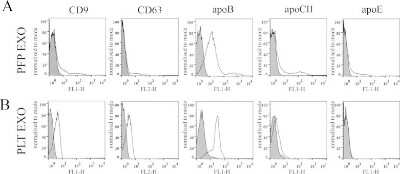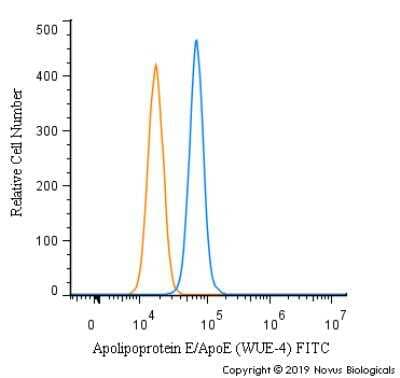Apolipoprotein E/ApoE Antibody (WUE-4) [FITC]
Novus Biologicals, part of Bio-Techne | Catalog # NB110-60531F


Conjugate
Catalog #
Forumulation
Catalog #
Key Product Details
Species Reactivity
Validated:
Human, Mouse, Rat (Negative)
Cited:
Human
Applications
Validated:
CyTOF-ready, ELISA, Flow (Intracellular), Flow Cytometry, Immunocytochemistry/ Immunofluorescence, Immunohistochemistry, Immunohistochemistry-Paraffin, Immunoprecipitation, Western Blot
Cited:
Flow Cytometry
Label
FITC (Excitation = 495 nm, Emission = 519 nm)
Antibody Source
Monoclonal Mouse IgG1 kappa Clone # WUE-4
Concentration
Please see the vial label for concentration. If unlisted please contact technical services.
Product Specifications
Immunogen
Purified human ApoE [UniProt# P02649]
Epitope
Residues 140-160 of purified human ApoE (LDLR receptor binding site).
Reactivity Notes
Reacts with human better than mouse. It does not appear to react with rat brain tissue.
Localization
Secreted
Specificity
This antibody detects ApoE2, ApoE3 and ApoE4 (PMID 2466929).
Clonality
Monoclonal
Host
Mouse
Isotype
IgG1 kappa
Scientific Data Images for Apolipoprotein E/ApoE Antibody (WUE-4) [FITC]
Flow Cytometry: Apolipoprotein E/ApoE Antibody (WUE-4) [FITC] [NB110-60531F] - Analysis of apoB-positivity in blood plasma and PLT concentrate-derived EXOs. FCM detection of the indicated markers in EXOs conjugated onto latex beads. The EXOs were isolated from fasting PFP or PLT concentrate by differential UC and gravity size filtration (gray histograms: blocked beads incubated with antibody, empty histograms: EXO sample). Image collected and cropped by CiteAb from the following publication (https://www.nature.com/articles/srep24316), licensed under a CC-BY license.
Flow Cytometry: Apolipoprotein E/ApoE Antibody (WUE-4) [FITC] [NB110-60531F] - An intracellular stain was performed on SK-MEL-28 cells with Apolipoprotein E/ApoE Antibody [WUE-4] NB110-60531F (blue) and a matched isotype control (orange). Cells were fixed with 4% PFA and then permeabilized with 0.1% saponin. Cells were incubated in an antibody dilution of 10 ug/mL for 30 minutes at room temperature. Both antibodies were conjugated to FITC.
Applications for Apolipoprotein E/ApoE Antibody (WUE-4) [FITC]
Application
Recommended Usage
CyTOF-ready
Optimal dilutions of this antibody should be experimentally determined.
ELISA
Optimal dilutions of this antibody should be experimentally determined.
Flow (Intracellular)
Optimal dilutions of this antibody should be experimentally determined.
Flow Cytometry
Optimal dilutions of this antibody should be experimentally determined.
Immunocytochemistry/ Immunofluorescence
Optimal dilutions of this antibody should be experimentally determined.
Immunohistochemistry
Optimal dilutions of this antibody should be experimentally determined.
Immunohistochemistry-Paraffin
Optimal dilutions of this antibody should be experimentally determined.
Immunoprecipitation
Optimal dilutions of this antibody should be experimentally determined.
Western Blot
Optimal dilutions of this antibody should be experimentally determined.
Application Notes
Optimal dilution of this antibody should be experimentally determined.
Formulation, Preparation, and Storage
Purification
Protein G purified
Formulation
PBS
Preservative
0.05% Sodium Azide
Concentration
Please see the vial label for concentration. If unlisted please contact technical services.
Shipping
The product is shipped with polar packs. Upon receipt, store it immediately at the temperature recommended below.
Stability & Storage
Store at 4C in the dark.
Background: Apolipoprotein E/ApoE
Alternate Names
APOE
Gene Symbol
APOE
Additional Apolipoprotein E/ApoE Products
Product Documents for Apolipoprotein E/ApoE Antibody (WUE-4) [FITC]
Product Specific Notices for Apolipoprotein E/ApoE Antibody (WUE-4) [FITC]
This product is for research use only and is not approved for use in humans or in clinical diagnosis. Primary Antibodies are guaranteed for 1 year from date of receipt.
